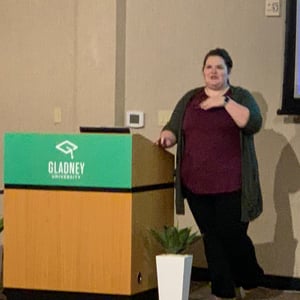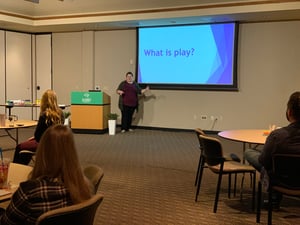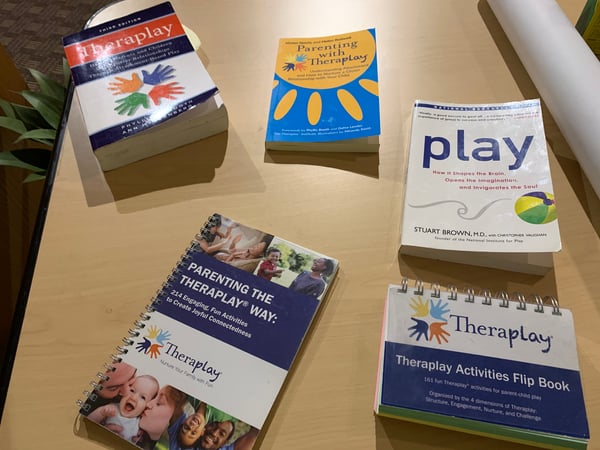 Yesterday, Gladney University participants had the pleasure of hearing from Lauren Labeth, LCSW, about Theraplay® and how she uses this in her practice with families. Lauren gave a quick overview of Theraplay® and why this mode of treatment is beneficial for all families looking to build a deeper connection with their children. Along with building a connection with others, we learned that play is used to promote the creation of new neural connections, learn social skills, and test situations in a safe environment. For children that have experienced trauma or diagnosed with a developmental delay, play is crucial for brain development and relationship building.
Yesterday, Gladney University participants had the pleasure of hearing from Lauren Labeth, LCSW, about Theraplay® and how she uses this in her practice with families. Lauren gave a quick overview of Theraplay® and why this mode of treatment is beneficial for all families looking to build a deeper connection with their children. Along with building a connection with others, we learned that play is used to promote the creation of new neural connections, learn social skills, and test situations in a safe environment. For children that have experienced trauma or diagnosed with a developmental delay, play is crucial for brain development and relationship building.
The second half of the day was spent experiencing typical activities Theraplay® uses to promote attunement, regulation, and connection. This was by far my favorite part, not only as a professional, but as a parent of two. Although all of the activities were amazing, if I was forced to pick my favorite three, it would be “Caring for Hurts,” “Imaginary Toss,” and “Seed Spitting.”
 During the “Caring for Hurts” activity, families work on the nurturing aspect of their relationship. Each person is able to pick out their favorite bandage and ask the other where their hurt is. This can be a physical or emotional hurt--actual or symbolic. My partner for this activity had been carrying heavy AdoptED To Go boxes most of the morning and had a sore knee. I was able to put her Emoji-themed bandage on her knee to symbolize my desire for her to feel better. When it was my turn, I literally had a paper cut on my finger and my partner was able to put my Disney-themed bandage on, which actually provided some relief from the sting of the cut!
During the “Caring for Hurts” activity, families work on the nurturing aspect of their relationship. Each person is able to pick out their favorite bandage and ask the other where their hurt is. This can be a physical or emotional hurt--actual or symbolic. My partner for this activity had been carrying heavy AdoptED To Go boxes most of the morning and had a sore knee. I was able to put her Emoji-themed bandage on her knee to symbolize my desire for her to feel better. When it was my turn, I literally had a paper cut on my finger and my partner was able to put my Disney-themed bandage on, which actually provided some relief from the sting of the cut!
The next activity, “Imaginary Toss” was a group game. Everyone got in a circle and one person started off by tossing an imaginary object to another person in the group. We had to learn each other’s names, which was challenging on short notice, but also fun and quickly built a sense of community. As you said someone’s name, you told them what you were tossing and they had to quickly react on how you would actually catch that type of object. Things got pretty creative! A Prius, panda, and a watermelon were a few examples of things that were thrown. This was an engagement activity that helped create moments of emotional connection, focused on others in an exclusive way by being sensitive soothing and delightful in the interaction, and helped with noticing and being in tune with another person’s state.
The last activity, we didn’t do, but just hearing about it made me want to go home and try it out. “Seed spitting” was a challenge activity. Challenge activities help support the child’s natural instincts to explore the world after having established a secure base, help stretch a child’s skills a little, support development, growth, and a sense of competence, and help a child manage experiences that give the feeling of tension. Seed spitting, could be used with seeds, or Tic Tacs or technically anything you could put in your mouth and spit a good distance. Lauren prefaced she always tells her clients that this is a special activity they only do in her office unless their parents give permission to do at home. (It can get a big messy.) Everyone gets a Tic Tac and sees who is able to spit it furthest. Lauren discussed that because parents are adults, most of the time they are able to win these games, but that it was important to allow the child to be successful some of the time.
 What I loved most about all of the activities were their simplicity. Items used could easily be obtained at a discount store for a very nominal amount and most of the time, items were things you already had around the house. I also loved that all of these activities could be done at any age with slight variations or modifications. One of the key components of Theraplay® is about being in the here and now, which is rare in today’s busy and fast paced life. I don’t know about you, but I’m always thinking two steps ahead of what needs to be done next. “I have to get dinner ready. After that it’s bath-time. I need to pack lunches, backpacks, etc. I've got to make sure I call my friend back this evening, and have to schedule that doctor's appointment and make the payment for those bills.” It’s a skill to be mindful of the here and now. Yes, tasks and prepping for the next day are important, but more importantly I want to make sure my children feel connected, cared for and seen. If a short game of seed spitting can help with that, I’ll take the mess---or maybe move it outside.
What I loved most about all of the activities were their simplicity. Items used could easily be obtained at a discount store for a very nominal amount and most of the time, items were things you already had around the house. I also loved that all of these activities could be done at any age with slight variations or modifications. One of the key components of Theraplay® is about being in the here and now, which is rare in today’s busy and fast paced life. I don’t know about you, but I’m always thinking two steps ahead of what needs to be done next. “I have to get dinner ready. After that it’s bath-time. I need to pack lunches, backpacks, etc. I've got to make sure I call my friend back this evening, and have to schedule that doctor's appointment and make the payment for those bills.” It’s a skill to be mindful of the here and now. Yes, tasks and prepping for the next day are important, but more importantly I want to make sure my children feel connected, cared for and seen. If a short game of seed spitting can help with that, I’ll take the mess---or maybe move it outside.
We’d love to hear your suggestions and feedback about what future trainings you’d like to see so please add those to the comments below. Click below for upcoming Gladney University training.







